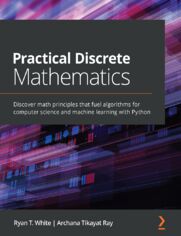Practical Discrete Mathematics - Helion

Tytuł oryginału: Practical Discrete Mathematics
ISBN: 9781838983505
stron: 330, Format: ebook
Data wydania: 2021-02-22
Ksi─Ögarnia: Helion
Cena ksi─ů┼╝ki: 161,10 z┼é (poprzednio: 179,00 z┼é)
Oszczędzasz: 10% (-17,90 zł)
A practical guide simplifying discrete math for curious minds and demonstrating its application in solving problems related to software development, computer algorithms, and data science
Key Features
- Apply the math of countable objects to practical problems in computer science
- Explore modern Python libraries such as scikit-learn, NumPy, and SciPy for performing mathematics
- Learn complex statistical and mathematical concepts with the help of hands-on examples and expert guidance
Book Description
Discrete mathematics deals with studying countable, distinct elements, and its principles are widely used in building algorithms for computer science and data science. The knowledge of discrete math concepts will help you understand the algorithms, binary, and general mathematics that sit at the core of data-driven tasks.
Practical Discrete Mathematics is a comprehensive introduction for those who are new to the mathematics of countable objects. This book will help you get up to speed with using discrete math principles to take your computer science skills to a more advanced level.
As you learn the language of discrete mathematics, you'll also cover methods crucial to studying and describing computer science and machine learning objects and algorithms. The chapters that follow will guide you through how memory and CPUs work. In addition to this, you'll understand how to analyze data for useful patterns, before finally exploring how to apply math concepts in network routing, web searching, and data science.
By the end of this book, you'll have a deeper understanding of discrete math and its applications in computer science, and be ready to work on real-world algorithm development and machine learning.
What you will learn
- Understand the terminology and methods in discrete math and their usage in algorithms and data problems
- Use Boolean algebra in formal logic and elementary control structures
- Implement combinatorics to measure computational complexity and manage memory allocation
- Use random variables, calculate descriptive statistics, and find average-case computational complexity
- Solve graph problems involved in routing, pathfinding, and graph searches, such as depth-first search
- Perform ML tasks such as data visualization, regression, and dimensionality reduction
Who this book is for
This book is for computer scientists looking to expand their knowledge of discrete math, the core topic of their field. University students looking to get hands-on with computer science, mathematics, statistics, engineering, or related disciplines will also find this book useful. Basic Python programming skills and knowledge of elementary real-number algebra are required to get started with this book.
Osoby które kupowały "Practical Discrete Mathematics", wybierały także:
- Windows Media Center. Domowe centrum rozrywki 66,67 zł, (8,00 zł -88%)
- 68,18 zł, (15,00 zł -78%)
- Przyw├│dztwo w ┼Ťwiecie VUCA. Jak by─ç skutecznym liderem w niepewnym ┼Ťrodowisku 58,64 z┼é, (12,90 z┼é -78%)
- Superinteligencja. Scenariusze, strategie, zagro 68,18 zł, (15,00 zł -78%)
- Twoja firma w social mediach. Podr 57,69 zł, (15,00 zł -74%)
Spis tre┼Ťci
Practical Discrete Mathematics. Discover math principles that fuel algorithms for computer science and machine learning with Python eBook -- spis tre┼Ťci
- 1. Key Concepts, Notation, Set Theory, Relations, and Functions
- 2. Formal Logic and Constructing Mathematical Proofs
- 3. Computing with Base-n Numbers
- 4. Combinatorics Using SciPy
- 5. Elements of Discrete Probability
- 6. Computational Algorithms in Linear Algebra
- 7. Computational Requirements for Algorithms
- 8. Storage and Feature Extraction of Graphs, Trees, and Networks
- 9. Searching Data Structures and Finding Shortest Paths
- 10. Regression Analysis with NumPy and Scikit-Learn
- 11. Web Searches with PageRank
- 12. Principal Component Analysis with Scikit-Learn





